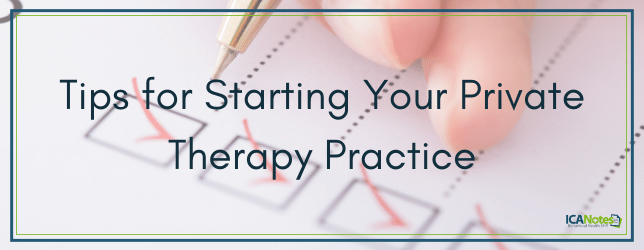Tips for Starting Your Private Therapy Practice
Starting a private therapy practice is often a daunting challenge. Even though you may be fully qualified to provide therapy and may have years of experience under someone else’s supervision, the idea of building a client base of your own as well as a business of your own all at the same time can be quite intimidating. Here are a few tips for starting a private therapy practice that may help.
1. Join a Group Practice
Before you go out completely on your own, consider joining forces with a few of your peers and starting a group practice. You can see your own patients, have a great source of referrals and share the business responsibilities with others in your position. You can also defray some of the costs of office space, supplies, etc. since they'll be shared among everyone in the group.
2. Talk to an Accountant
Find out where there is a local accountant who has worked with private therapy practices. Schedule a meeting to talk with them about the challenges and the best approaches to these challenges. If you are comfortable with the accountant, you might also want to hire them to handle some of the financial aspects of your new business.
3. Networking and Marketing
If you want your practice to be successful, you need clients. Sure, you may get some referrals from your existing clients, but in today’s environment, that is not enough. Take advantage of digital marketing opportunities and social media. Start a therapy blog and set up a Twitter account. Do whatever you can to get your name and what you do out there. It can be to your advantage as well to choose a specialization to brand yourself and help you stand out from others in the marketplace. Networking at seminars and other events where therapists are likely to congregate is also crucial to add to your referrals pool.
4. Be Smart About Expenses
You want to see clients in a comfortable, professional environment, of course, but there are ways to do this without overspending. Getting partners is one way. Renting your space out during the times you are not using it is another. Get creative and keep an eye on the bottom line.
5. Get Yourself Some Great Behavioral Health Electronic Records Software
Electronic health records are becoming standard for all areas of patient health care, including behavioral health. A good EHR system not only provides patients with easy access to their records — something that is becoming more and more important in our data-driven society — but it can also help you organizationally and with billing. ICANotes has an extremely robust behavioral health EHR solution that is easy to use, quick to install and makes issues like submitting insurance claims, billing patients and organizing records extremely simple and much more stress-free.
To learn more about ICANotes, call 866-847-3590 or contact us online to schedule a free trial or a live demo today.
Related Posts:
How To Increase Revenue in a Private Therapy Practice
Tips for Improving Psychotherapy Patient Retention

